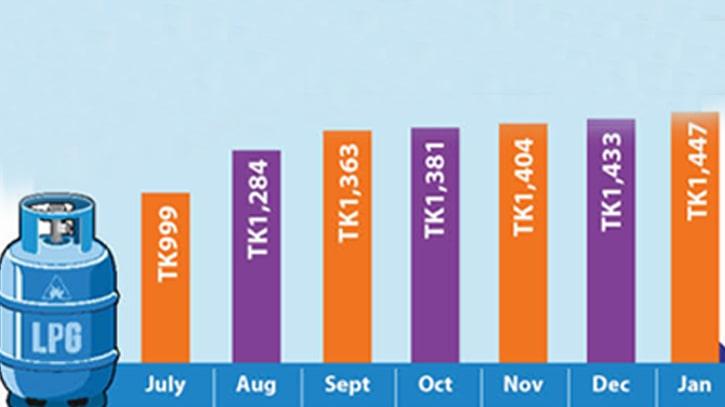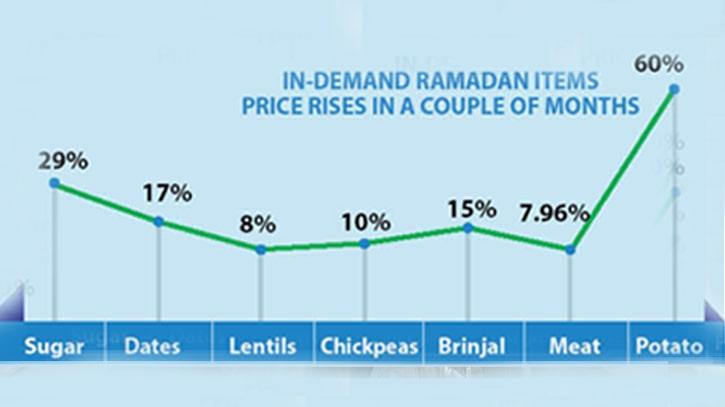Originally posted in The Daily Messenger on 7 February 2024
Cost of cooking rises by 48pc as Ramadan nears
At a time when the people of the country are already struggling with high prices of essential commodities throughout the year, the government has increased the price of Liquefied Petroleum gas by 47.54 percent in seven months, raising the cost of cooking for the masses as Ramadan approaches.

Furthermore, the government is randomly increasing all utility prices. Gas distribution companies have already applied to hike gas prices by 95 percent, while power prices are set to increase by 78 percent and water prices by 147 percent. Additionally, prepaid gas meter users have been paying Tk 200 as fare since January, resulting in a 10 percent increase in cooking costs.
During the last seven months, LP gas prices rose to Tk 1,474 in February from Tk 999 in July for a 12kg cylinder in July, while food inflation currently stands at 9.58 percent.
Professor Shamsul Alam, advisor to the Bangladesh Consumers Association (CAB), told The Daily Messenger, “The government is hiking prices to tackle their mismanagement and corruption. They don’t consider the public interest.”
Dr. Khondaker Golam Moazzem, a prominent industrial economist in Bangladesh currently serving as the Research Director at the Centre for Policy Dialogue (CPD), told The Daily Messenger, “Mainly, the government is raising prices aiming to reduce subsidy support. This kind of price hike affects the masses directly, especially households. Without increasing fuel and power prices, the government could still decrease subsidies and control inflation.”
He suggested that if the government could stop supporting power plants that demand high-capacity charges and reduce the import of LNG, extracting domestic fuel like gas and coal, prices might not need to increase. Then, the general populace could avoid repeated price hike pressures.
He also said, “Power and diesel prices are directly connected with agriculture and transportation, impacting all kinds of expenses. The cost of household items, including cooking, increases instantly.”
“Due to massive privatization and an import-based energy sector, utility prices are increasing significantly. If the government could make prudent sector policies, gas and power prices would be more affordable,” he further added.
In the last 14 years, the price of electricity has increased by at least 121 percent at the consumer level in 12 phases, and the average gas price has increased by 175 percent in five phases. The price of CNG in the transport sector has increased six times.
Additionally, the price of diesel has increased by about 237 percent, and the price of octane and petrol has reached approximately 169 percent. Dhaka WASA has increased water prices 14 times. Moreover, prices of Ramadan-demanded products have also increased: sugar prices rose by 29 percent, dates by 17 percent, and lentils by 8 percent over the past couple of months, according to retail markets.

A review by the Power Development Board (PDB) found that electricity prices could increase by an average of 78 percent if subsidies are withdrawn. If subsidies were eliminated entirely, the wholesale price would need to increase to Tk 12.11 per unit, resulting in a consumer-level price increase of Tk 14.68. The government agency recommends a gradual price adjustment to make it more affordable for the people.
Meanwhile, due to various reasons including the dollar crisis, the pace of business and trade has decreased, and new employment opportunities have become limited. Many people in the country are struggling to buy their daily food, according to reports from various national and international organizations.
According to the Trading Corporation of Bangladesh, which collects data from 12 kitchen markets in the capital, the prices of 1kg sachets of refined flour rose by 3.57 percent, and unpacked refined flour by 8 percent since mid-December.
Additionally, due to inflationary pressure, people from the middle class and lower income have reduced their protein intake in meals by 49 percent, according to the Global Food Security Index (GFSI).
However, the prices of different types of vegetables have risen from 100 to 150 percent, egg prices have increased from Tk 145 to Tk 148 per dozen, and chicken prices have risen by about 100 percent over the year.

